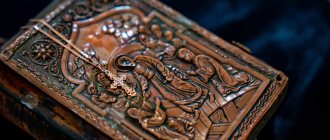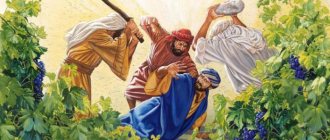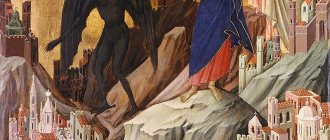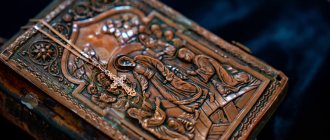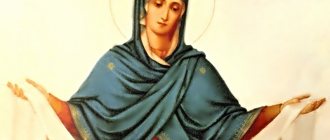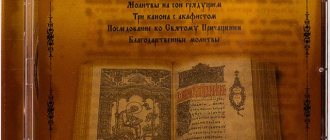The famous parable of the Prodigal Son is read in all Orthodox churches on the second week of the Holy Pentecost before Lent. The biblical story illustrates to readers an example of generosity, mercy and sincere repentance of a person for his actions.
At the end of the Divine Liturgy, the priest traditionally delivers a sermon with an interpretation and short excerpts from the story. This passage of the Gospel shows the true joy of the Lord at the repentance of a sinner using the example of the story of a father and son.
What is the main idea of the legend? What did Christ want to convey to us? Let's read the parable of the prodigal son briefly.
Parting
What was the first thing the man remembered? This is the picture: he, young, strong and determined, comes to his father and says:
- Give me the due part of the inheritance. I want to manage my estate myself.
He remembered how his older brother frowned and how his mother covered her mouth in horror. But I was ready for it. Yes, such words were tantamount to saying: “Father, I don’t have time to wait until you die to get my share. Give it to me now, let’s consider that you are already dead for me.” And he knew that everyone at home would be outraged by his demand. However, he had already decided everything for himself and now waited for his father to answer him. If he refuses, he will still leave here forever, albeit empty-handed. Just so as not to depend on the father anymore, not to feel like the youngest and powerless in the house. Freedom is his goal! He was now ready to achieve it at any cost. And, clenching his fists, he waited for his father’s answer.
Everyone around feared that the father would curse the daring madman and drive him out of his house forever. But the father only looked into the wide open eyes of his youngest son. And nodded understandingly:
- Fine. I will tell my steward, and he will calculate what share you are entitled to from my estate. Tomorrow you will receive your inheritance. Is there anything else you need from me?
The son did not expect such quick and complete agreement. Therefore, blinking in confusion, he just muttered:
“No, thank you...” and hurriedly left, closing the door behind him.
The next day he stood in the yard and watched how workers poured grain into bags, how they drove bleating sheep and milk cows into a separate pen, and how handsome horses were led out of the stables. Nearby on the ground there were already rich harnesses, carpets, beautiful jugs and dishes made of copper and silver and many other expensive things. Finally, the workers brought a heavy casket with gold coins. All this was the share of the youngest son. When everything was counted and collected, the father came out of the house with a sheet of parchment.
“Here I testified that from now on all this belongs only to you,” he said.
The manager brought a burning candle to the parchment so that a few drops of melted wax fell onto the parchment. The father carefully made an impression of his ring, which he wore on his right hand, in wax. Now no one could accuse his son of stealing this estate.
“Own it, now all this is yours by right,” the father said quietly.
The son took the piece of paper. He got what he wanted. But for some reason there was no joy in his soul. And it was much more difficult for him to look into his father’s eyes than yesterday, when he came to demand his inheritance.
A very short retelling
The Prodigal Son in a nutshell: a biblical story about a boy who wanted to live separately from his family, and what ultimately came of it.
Having left his father's house, he could not survive on his own for long. Immorality and wastefulness led him to poverty. Returning home with nothing, he did not hope for forgiveness. The old father showed generosity: he not only forgave his youngest son, but also arranged a feast in honor of his return.
The content of the parable is clearly illustrated in the plot of paintings by famous artists from different countries.
Fragment of Rembrandt's painting "The Return of the Prodigal Son"
Pleasure
...The following picture appeared before the traveler’s eyes. He is in luxurious clothes, hung with gold chains and bracelets, feasting in a big city with many new friends. He immediately sold the entire inheritance to visiting Syrian merchants. Why does he need all these dirty sheep and cows? What should he do with the grain and corncobs? His soul wanted something completely different - joy, fun and most importantly - freedom!
And all this can easily be bought for money. And now he has so many of them that he can enjoy the long-awaited freedom all day long to the music of skilled flutists and the dances of beautiful dancers. The best wine, the most delicious food, beautiful girls to whom he gives jewelry and pieces of silk for dresses - he has all this every day! You no longer need to travel around dusty fields and gardens with your father, you no longer need to listen to the boring grumbling of your older brother, or see your mother’s reproachful gaze. He's free! And you don’t have to answer to anyone else in your life!
The main meaning of the parable
Even though the parable of the Prodigal Son is a short story, it contains the deepest meaning for Christians. A prodigal son is any person who has alienated himself from the Creator and given himself over to a sinful life.
The Holy Fathers interpret the text as follows:
- for any person, repentance is a great power to cleanse the soul;
- You should value staying in your parents’ house and not rush to freedom early;
- Everyone has failures, misdeeds are not a reason to be excommunicated from the Church;
- While a person is alive, he has the opportunity at any moment to change his life for the better and get closer to the Kingdom of Heaven;
- nothing can be changed after death;
- honoring parents is a mandatory condition of life;
- The position of a sinner without God is disastrous;
- whatever a man sows, that he will also reap.
The parables of Christ are short stories told in simple language. This is one of the ways to teach people spiritual wisdom, understanding the meaning of life on Earth. The text of prayer books, services, the essence and history of church holidays throughout the year, moral teachings - all this is based on the parables of Christ. The legend about the frivolous youth and his unreasonable act relates to the section of the birth and growth of the Kingdom of God in the soul.
Reading and understanding biblical texts allows you to take a fresh look at your existence. Through parables we communicate with God, who expects from us humility, obedience, and love for our neighbor.
Devastation
...But the money from the sold estate ran out. Where are the cheerful friends who swore allegiance now? Where are the beautiful girls who promised ardent love until the end of their days? They melted away like smoke as soon as the young man saw that the casket with gold was empty. The musicians left and took with them the sweet-sounding flutes. And the joy went with them. True, there are still gold chains and bracelets left. But they also had to be sold soon. Famine began in the country. The jewelry sold was barely enough to pay for a cheap hotel and a meager lunch. And then the decorations ran out...
It became scary to live in the city. Gangs of hungry vagabonds roamed the streets, looking out for which house was wafting smoke from the fireplace. If there is smoke, it means dinner is being cooked in the house. Tramps, mad with hunger, burst into their owners’ homes, took their food and, choking, ate it right there.
The young man had enough prudence not to join these gangs. He remembered how as a child he helped his father with housework, and went out of town to the village. Perhaps there will be some work for him there? But even in the villages food was poor. After long wanderings, he joined a villager as a swineherd.
Every morning he drove a small herd of pigs out to pasture and made sure that predatory animals did not sneak up on them. For this, the owner once a day gave him a bowl of thin soup made with flour and a piece of stale bread. The young man, of course, did not have enough of this to get enough. He was hungry all the time so badly that he asked the owner to give him some dried carob pods, which were added to the pigs' feed. But the owner answered with a grin:
— I feed the pigs so that I can sell them later. Why should I waste food on you? Be glad that you have at least some stew.
At night the young man could not sleep from hunger. All this time he stubbornly pushed away memories of his parents' home. After all, he left there forever, his share there is no longer there. Now he is a stranger to all his relatives. But then suddenly an unexpected idea occurred to him: “How many of my father’s workers eat enough bread. And here I am dying of hunger. Yes, I am no longer worthy to be called his son. But I can hire him on his farm as a simple worker. And I will have normal food every day!”
The thought of this made the young man so happy that he did not even wait for the morning. Moreover, he didn’t have long to get ready. He took with him only a shepherd's crook and a torn cloak, which the owner gave him to the pasture on rainy days. Having calmed the dog, which had just woken up, he quietly closed the gate behind him and set off on the long journey home.
Interpretation
The return of the prodigal son is an example of turning to God. Reading this gospel story, we can follow the younger son step by step and pay attention to the paradoxical nature of this process of conversion: it appears to us not so much as an actual turning to God, but rather as an understanding of the truth that God has been addressed to us from the very beginning. However, this text cannot be reduced only to its morality. Lectio divina is called to seek in Scripture not only moral, but also spiritual and eschatological meaning. The parable of the Prodigal Son, which can also be called “the parable of the father’s mercy,” is a description of the image of the Triune God inviting us to the feast of the Lamb.
Three stages of conversion The return of the son consists of three phases. Turning to God is a process that always requires time and gradualism.
First phase
- the son’s awareness of his poverty. After spending some time away from his father’s shelter, the son, says Christ, “began to be in need.” The process of this awareness takes place in two stages. At first, according to the Gospel, the son “came to his senses.” After all, sin takes us away from ourselves. Without realizing your own poverty, it is impossible to convert; there is no turning to God without first returning to oneself. The second stage of this realization is hope for improving the conditions of one’s life: “How many of my father’s hired servants have an abundance of bread, but I am dying of hunger,” the son says to himself. All this may seem very selfish: the reason for the son’s return is bread. In fact, it would be a mistake to think that the motive for our desire to turn to God is only our love for Him; He is deeply mistaken who believes that our hopes become pure when we turn to God. We need to realize that our conversion is often self-serving. Only God—not us—He alone can make our desires truly Christian. Awareness of our sins, which can also be called “contrition” (in moral theology: attritio), is the first stage of our return to God.
Second phase of the son's conversion
- action. It, like the first, consists of two stages. The first stage is the decision. The son thinks: “I will get up and go to my father.” Indeed, the clarity of awareness of our poverty, the hope of improving our situation would be harmful and even destructive if they did not prompt a concrete solution. The second stage of the son’s action is verbal recognition: “Father! I have sinned (...) and am no longer worthy to be called your son.” So, “coming to your senses” and your sins means driving out the evil one. Truly, sins, like vampires in movies, disappear in the rays of light
Awareness of poverty, transition to action...
Now came the third and most important phase of the prodigal son's conversion. While the son is still on the way, and “while he was still far away,” he sees that his father in his mercy comes out to meet him. The father, according to the Gospel, “saw him and took pity; and, running, fell on his neck and kissed him.” Here is the paradox of conversion: turning to God is not so much a search for God as it is the realization that God is looking for us. Since Adam sinned, like the prodigal son, demanding his share of the estate, God has been constantly looking for the lost sheep. Remember: immediately after the fall of Adam, God called to him and asked: “Where are you?” The parable of the prodigal son is an explanation of the first fall.
But this third phase of the son’s return has another, no less important meaning. The prodigal son had false ideas about his father. He thought that his father would no longer accept him, would no longer recognize him as his son. “I am no longer worthy to be called your son,” he wanted to tell him, “accept me as one of your mercenaries.” We can compare this phrase with the misconceptions about the Lord that the servant in the parable of the talents reveals when he says, “I was afraid of you because you are a cruel man.” The prodigal son, finding the love of his father waiting for him, regretted that he had been unfaithful. This regret is no longer about one’s own poverty and sins, as in the beginning, but about the wound inflicted on the father: “I have sinned against heaven and before you.” This regret, which can be called “repentance” (in moral theology: contritio), is a sign of our return to the love of the Lord. This was the third and final phase of the son’s conversion.
An Invitation to the Feast of the Lamb So, based on the example of the prodigal son, we can say that every appeal to God consists of three stages: contrition, action and repentance. However, it would be a mistake to interpret this parable only from a moral point of view. In fact, it has not so much a moral as a spiritual meaning. The return of the prodigal son is not just an example for all sinners. It tells us much more about God than about us, it describes the true image of God the Trinity.
Rembrandt, depicting this gospel story, understood well that the essence of the parable is not only in its morality. His creation is not just a work of art, a genre scene; this is a genuine icon of the Trinity. The father's hands are depicted in the very center of the picture and in its brightest part, they lie on the shoulders of his son. It is often said that they are a symbol of the Holy Spirit regenerating the son. It is no coincidence that Rembrandt’s painting is compared to Andrei Rublev’s “Trinity,” which depicts a visit to Abraham by three angels.
One of the similarities between this Old Testament Trinity and the parable of the Prodigal Son is the calf with which Abraham treats his guests, and the father treats his son. This calf, of course, is a symbol of the Eucharist, a symbol of the feast, that is, a symbol of our communion with the Trinity itself. The painting “The Return of the Prodigal Son,” like Rublev’s Trinity, is an invitation to enter the holy of holies of divine life, the sacrament of the eldest son, to whom the father said: “My son! You are always with me, and all that is mine is yours.” To turn to God means, first of all, to respond to the invitation of the Trinity itself to the feast of the Lamb.
priest Iakinf Destivel OR
Simeon filled his comedy with various musical numbers - vocal and instrumental. True, the musical material has not been preserved, and we do not know who the author of this music was.
The comedy of the parable of the prodigal son is the first play in Russian professional theater from family life, built on an acute dramatic clash between representatives of two different generations.
The playwright's position in this conflict is interesting; on the one hand, he justifies the need for education and travel abroad, preaches the gentle, good-natured attitude of elders towards the mistakes and misdeeds of young men, and on the other hand, he is clearly aware that the Moscow “prodigal sons”, wandering abroad, are compromising the Latin education for which he advocated so zealously. The drama of Polotsky's play lies not in the action (it is quite static and conditional), not in the speeches of the characters, but in that fatal conditionality and doom of a free-thinking person, whose good aspirations for novelty in practice lead to the triumph of a strong and inert antiquity. And Polotsk teaches not only inexperienced youths, but also older ones. In a word, the comedy of the parable of the prodigal son was a lesson not only for sons, but also for fathers.
For the first time in Russian drama, the main character of the play is a young man, burdened by life not only in his father’s house, but also in his native country in general. He does not want to “destroy his youth in his native country.” Characteristic of Simeon is the conclusion that he forced the prodigal son to make after his fruitless attempt to find his happiness in a foreign land:
I know that it is bad to be in youth now,
If anyone wants to live without science...
Once again, this time from the stage, Polotsky preaches the love of learning, of science, of knowledge. The educational role of this comedy is obvious.
Finally, something should be said about the language of this play - simple and clear, close to colloquial speech. The biblical images in it became fuller, more accessible and understandable to the audience, closer to them and to life.
During Polotsky's lifetime, his plays were not published; only handwritten copies of them have reached us. The Comedy of the Prodigal Son was published at least five times in the 18th century. The first lubok researchers believed that the date in the title of the lubok edition, 1685, meant the date of the first publication. An expert on Russian popular print, D. A. Rovinsky, believed that the boards from which the comedy was printed were drawn by Picard, and engraved by L. Bunin and G. Tepchegorsky. However, in later works devoted to Russian engraved publications, this opinion was refuted. “The Story... of the Prodigal Son” was engraved no earlier than the mid-18th century by a master from the circle of M. Nekhoroshevsky. 1685 is not the date of publication of the book, but the date of the manuscript. In addition, in 1725, a reprint was made from one of the popular prints especially “for lovers of Russian literature.”
Lubok editions of Polotsky's play were very popular in the 18th century. The owners of these books tried in special notes on the cover not only to consolidate their right of ownership (“This fairy tale belongs to the village of Usadishch to the peasant Yakov Ulyanov, and this was written by Yakov Ulyanov, a servant”), but also noted their attitude to what they read (“This book was read by 1 of the 1st Furshtat battalion, 1st company, Private Stepan Nikolaev, son of Shuvalov, and history is very useful for all young people, teaching abstinence from luxury and drunkenness"). So, in the 18th century, readers primarily emphasized the moralizing meaning of the play and noted its importance for the education of young people.
The illustrations included in the editions of Polotsky’s play cannot serve as a source for us to reconstruct the stage history of the play. The characters in these pictures are dressed in Dutch style suits and hats. The spectators are also depicted as foreigners - they are shaven, wearing hats with curved brims.
Polotsky is the first Russian playwright known to us. In accordance with documentary sources, the beginning of the birth of the Russian theater dates back to October 17, 1672 - the time of the production of the first play under the direction of the German Gregory on the stage of the Russian court theater. Half a century ago, V. N. Peretz wrote: “Simeon Polotsky staged his plays... after
experience of foreign comedians;
they paved the way for him, they gave him the confidence that even in Moscow one could see dramatic adaptations of biblical stories on stage. And before
the Germans, Simeon was silent, not daring to act as a playwright.”
Yes, that's right, Polotsky staged his plays after Gregory. But Gregory himself staged his plays after
those solemn “declamations” of Polotsk, which sounded under the arches of the Kremlin back in 1660. It was after this “declamation,” as mentioned above, that Alexei Mikhailovich’s desire arose to call “masters of comedy” from Western Europe. Consequently, both the role and place of Polotsk in the history of Russian theater must be clarified.
Fyodor, the fifteen-year-old son of Alexei Mikhailovich, became Russian Tsar on January 30, 1676. When the father died, the son was sick: he lay, swollen, in bed. His guardian, Prince Yuri Dolgoruky, and the boyars took Fedor in their arms and carried him to the royal throne, and then congratulated him on his accession to the kingdom. The widow of the deceased Tsar, Natalya Kirillovna, together with the young Tsarevich Peter, was removed to the village of Preobrazhenskoye, and the relatives of Tsarina Maria Ilyinichna, the Miloslavskys, began to dominate the palace. Boyar A.S. Matveev was sent into exile in Pustozersk, Patriarch Joachim began to brutally persecute everyone who sympathized with Western European customs and morals. But he could not do anything with the royal teacher Simeon of Polotsk: his authority was too great for the youth who became king.
With the accession of Fyodor Alekseevich, Simeon received complete freedom of action. Simeon even tries to renounce the honorary right to attend palace ceremonies and ceremonial feasts; he devotes all his free time to composing new poems. The hard work of this learned monk is amazing: all day long he sits straight in his now spacious cell in the Zaikonospassky Monastery, food and drink are brought to him from the royal table; A finely sharpened quill pen quickly runs across a sheet of paper, filling one page after another. His student, S. Medvedev, said about Polotsk that he wrote every day on 8 double-sided sheets of paper the size of a modern school notebook.
He wrote like this: “Every day I have a pledge to write at half past twelve in a half-notebook, and his writing is extremely small and tedious...” Simeon not only wrote, but also, perfectly understanding the meaning of the printed word, took an active part in the publication of his works.
Nothing expands fame so much,
Like a seal... -
he asserted in the poem “The Desire of the Creator.”
Wanting to speed up the publication of his works, Simeon makes a request personally to the Tsar to create another printing house in Moscow. The number of books published by the Printing House decreased noticeably, and mainly liturgical literature was printed there. Although the king was busy with his personal affairs at that time, and the illness was reminding itself more and more often, he still found an opportunity to satisfy the request of his former teacher. In 1678, in the premises of the royal court, on the second floor, a new printing house was established, which soon received the name “Upper”. This was an unusual printing house for that time - the only one in Rus' that had the right to publish books without the special permission of the patriarch. In other words, she was freed from spiritual censorship.
The first printed book published by this printing house was the Primer of the Slovenian Language. It was published in 1679 and was intended for Peter I, who by this time was 7 years old, and it was at this age that in 17th-century Rus' they began to study the primer.
What words can convey the feelings that overwhelmed Simeon when he held his printed brainchild in his hands - a small-sized book (1/8 of a page), typed in a clear font, with cinnabar letters and headpieces, so elegant, so well-ordered and tempting even in its appearance? in sight!
One of the two sons asked his father to give him half of the property. The father complied with the request, dividing what he had between his sons.
A few days passed and he, taking with him everything he received, set off for distant lands. He lived, didn’t bother, and squandered his inheritance.
After he ran out of money, the country fell into famine. He had a need to look for food and shelter. The youngest son got a job caring for and herding pigs. He was so in need that he was glad to have the stew of these domestic animals, but he was not allowed to take this food.
Thinking about what was happening, he realized that his father’s slaves ate better. I will go and ask for forgiveness from my father, and I will hire myself as a worker for him. So he did.
Even at a distant distance, his father saw him, took pity and forgave him. He hugged his prodigal son and kissed him. - Father! My sin is great and I am unworthy to be your son! - he said - Get me a job with your servants!
The father ordered his son to be dressed in the best clothes and shoes. Bring a fat calf and we will rejoice, since my son has risen from the dead. And the fun began. The elder brother worked in the field all day, approaching the house, he asked the servants: “Why is everyone walking? And he didn’t like that his father accepted his younger brother that way. He stood and did not want to cross the threshold of his father’s house.
I’ve been working for you for so many years and I’ve never disobeyed you, and you didn’t even give me a kid to go out with your friends.
But the father came out and called his eldest son.
Son! You live inseparably with me and everything that is mine is yours, but you should be glad that your younger brother was lost and found. Died and rose again!
The parable teaches: Leading a sinful lifestyle, a person destroys his soul and all the gifts (abilities, health, life) given by our Father. The Lord our Father rejoices with the Angels at the repentance of sinners, which takes place humbly and with hope.
Return
...And now he stands in the middle of the road, not daring to take a step. What if his father drives him away in anger, without even listening? What if he doesn’t even agree to hire such a worthless person? This is what the traveler was thinking about as he eagerly looked at his home. His eyes were dry, but his heart was crying and squeezing with melancholy.
Then the door of the house opened and a familiar silhouette appeared on the porch. Father! Well, that’s it, now I definitely won’t have the courage to approach the house under his gaze. The exhausted, unhappy traveler already wanted to turn around and go away wherever his eyes were looking. How suddenly his father saw him!
Tangled in his home clothes, almost tripping on the steps, he ran towards his son, hugged him, and pressed him to his chest. The son stood and listened to the beating heart of his father, out of breath from running fast. With his tongue unruly from excitement, he began to utter words that he repeated to himself many times on the way home:
- Father! I have sinned against heaven and before you and am no longer worthy to be called your son. At least accept me as an employee.
But the father did not seem to hear these words. He kissed his son. Then, turning to the servants who ran up, he said:
“Bring the best clothes and dress him, and put a ring on his hand and shoes on his feet.” Bring the fatted calf and slaughter it, let’s eat and have fun! Because this son of mine was dead and is alive again, he was lost and is found!
And there was a joyful feast. The father invited all his relatives and friends, all the servants and workers who worked in the fields. People ate delicious food, sang funny songs, and congratulated the father on the return of his son. And the son himself, wearing new master’s clothes and a ring on his hand, sat in the place of honor.
Before he could fully understand what had happened, he suddenly found himself, instead of a hired worker, a master. After all, the ring that his father gave him was not a simple decoration. It was a sign of power, giving the right to command servants, give orders, enter into transactions, sealing them with a seal carved on the ring. His father restored him to his former dignity. He again became one of the masters in his home. This made him a little uncomfortable. But his heart was filled with quiet joy.
Interpretations and sayings of the holy fathers:
- Until death comes, until the doors are closed, until the opportunity to enter is taken away, until horror attacks the universe, until the light fades..., ask, sinner, bounty from the Lord (St. Ephraim the Syrian).
- Even if we are hated by God for our sins, we will be loved again for our repentance (St. Neil of Sinai).
- Cry over sin, so that you do not cry about punishment, be justified before the Judge before you appear before the judgment seat... Repentance opens heaven to a person, it elevates him to paradise, it defeats the devil.
- There is no sin, no matter how great, that overcomes God’s love for mankind if at the appropriate time we repent and ask for forgiveness.
- Great is the power of repentance if it makes us as pure as snow and white as a wave, even if sin has previously stained our souls (St. John Chrysostom).
- Whether you are in your father’s house, don’t rush out to freedom. You see how such an experience ended! If you ran away and are wasting your time, stop quickly. If you have squandered everything and are in poverty, decide to return as soon as possible, and return. All the indulgence, the old love and contentment awaits you there. The last step is the most necessary. But there is no need to expand on him. Everything is said briefly and clearly. Come to your senses, decide to return, get up and hurry to the Father. His arms are open and ready to receive you (St. Theophan the Recluse).
Parable of the Prodigal Son. Text
The father had two sons. One day his youngest son asked him for part of the estate that belonged to him. The father did not resist and gave everything that was due to him. A few days later, the youngest son, taking his part of the inheritance, left for distant lands. Not caring at all about the future, he began to live dissolutely and, as people say, “in grand style.” Acting in such a stupid way, he very quickly squandered all his wealth, and when famine struck the city, he began to be in dire need of food.
In order to somehow survive, he got a job with one of the local residents and began to herd his pigs. This guy was happy to eat horns intended for pigs, but no one allowed him. Completely exhausted by hunger and poverty, he suddenly remembered his father and the fact that all his mercenaries eat bread, but his own son will soon simply die of hunger.
